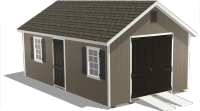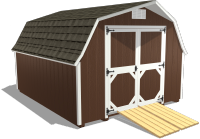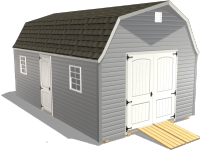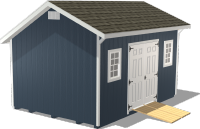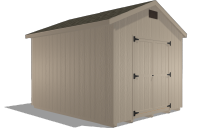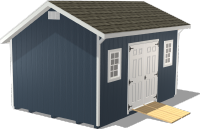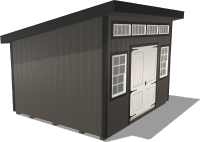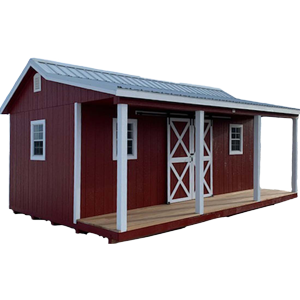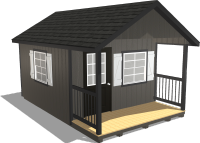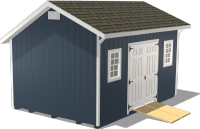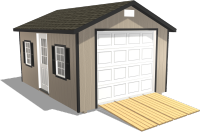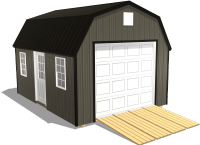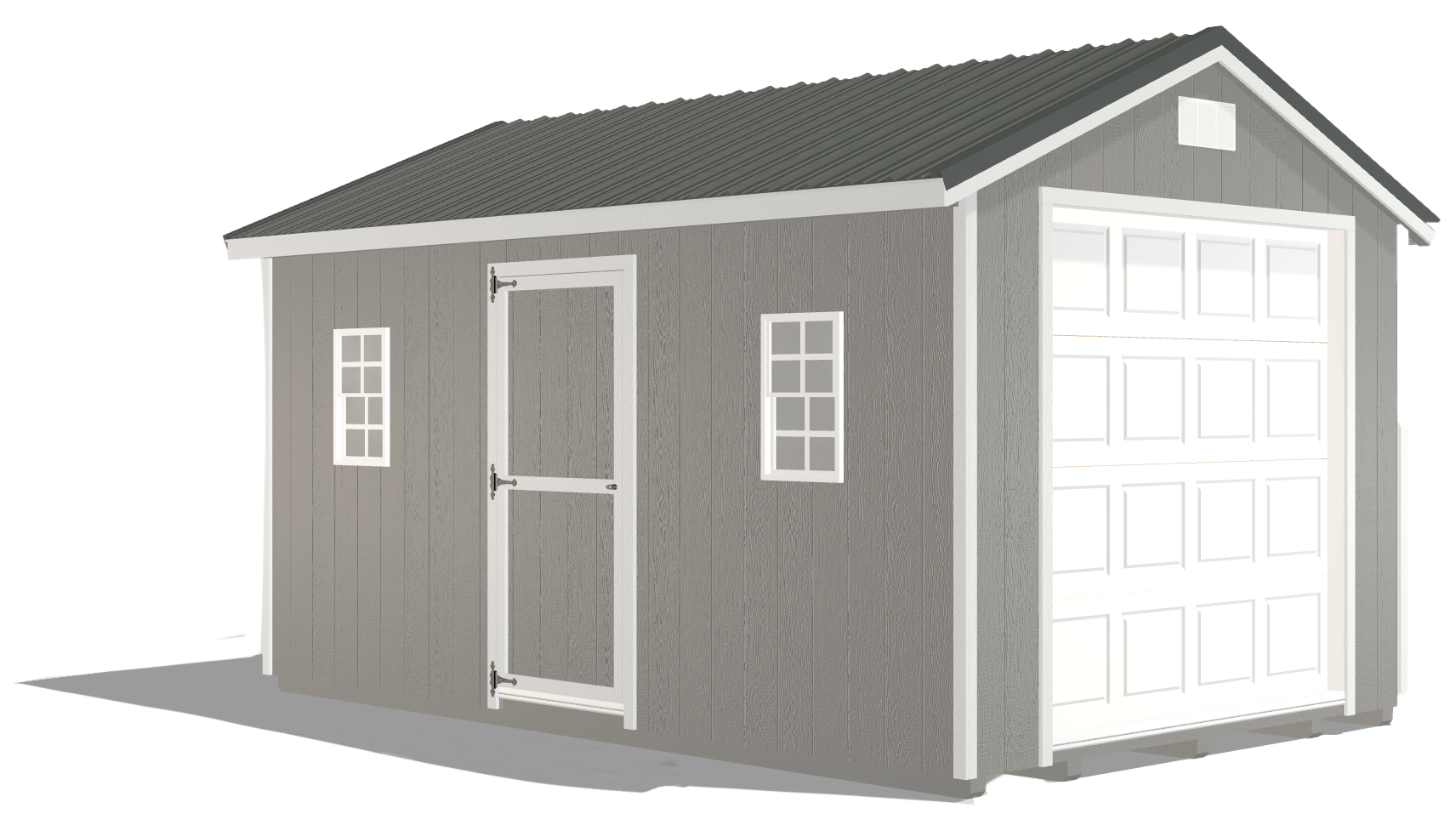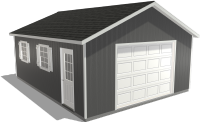Shop Smart: Tips for Choosing the Right Chicken Coop Designs
by Dakota Storage Buildings, on March 13, 2024
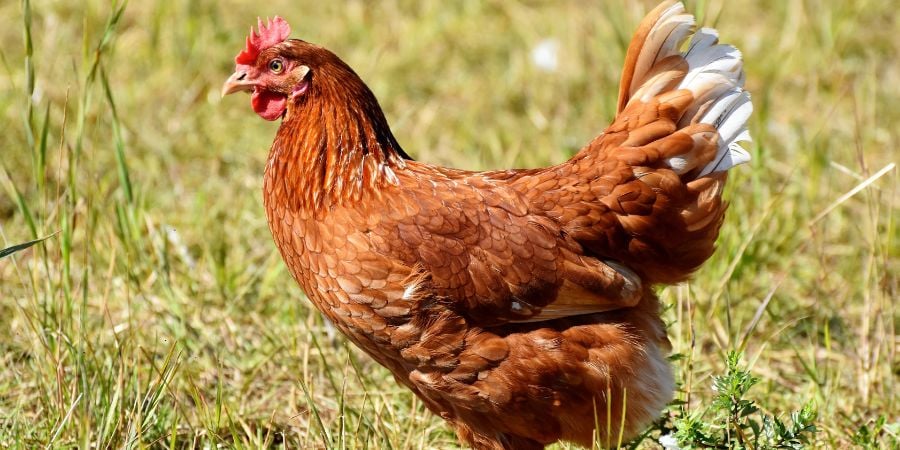
Chicken coops are indispensable in ensuring your chickens' safety and well-being. Making the right choice from the available options, however, can be a daunting task. The decision involves more than just picking a style; it is about finding the right balance of size, ventilation, accessibility, and comfort for your flock. Factors such as climate, the number of chickens you have, and your backyard space also play a critical role in this decision. Understanding the nuances of free-range and enclosed chicken coop designs is key to selecting one that not only meets the basic needs of your chickens but also integrates well with your lifestyle and the environment of your homestead. This choice, while seemingly simple, impacts the health and happiness of your chickens and, by extension, the quality of life and productivity of your entire homestead.
Coop Features Every Chicken Keeper Should Look For
The well-being of your flock is a significant responsibility that should not be taken lightly. As their primary caregiver, their safety, nutrition, and overall care lie in your hands. This is why investing in a well-constructed, durable coop is critical. It is a safe place for your chickens, shielding them from predators and harsh weather, and providing a comfortable resting place. A happy and healthy flock is a productive one. Here are some key features every coop should have.
Necessary Features
Pop door: This is more than just an entrance and exit for your chickens; it is a critical component for ensuring their safety, especially at night. It should be sturdy enough to keep predators out, yet easy for the chickens to use.
Ventilation: Proper ventilation is essential for maintaining a healthy atmosphere inside the coop. It helps regulate the temperature, reduces humidity, and prevents the buildup of harmful ammonia from droppings. Adjustable ventilation, ideally placed high, allows you to control airflow based on seasonal changes.
Perch: Chickens have a natural instinct to roost off the ground, especially at night. Providing at least one foot of perch space per standard-sized bird allows them to sleep comfortably and maintain their pecking order. Ensure the perches are sturdy and positioned to prevent overcrowding.
Nesting Boxes: These are crucial for egg-laying. Aim for one box for every three to four hens. Boxes should be cozy, private, and placed in a quieter part of the coop to encourage egg-laying and make collection easier for you.
Ease of Cleaning: A coop that is easy to clean is vital for maintaining hygiene and the health of your chickens. Look for designs that offer easy human access to every corner of the coop, including removable trays for droppings and doors or panels that open for thorough cleaning.
Sufficient Space: Space is paramount. Each chicken requires enough room to move, feed, and rest without stress. Overcrowding can lead to pecking, bullying, and the spread of disease. Ensure the coop provides adequate space based on the size and number of your chickens, with room for growth if you plan to expand your flock.
By paying attention to these essential features, you can create a living environment that not only meets the basic needs of your chickens but also enhances their quality of life, ensuring they remain healthy, happy, and productive.
Upgrading Your Chicken Coop With Extra Add-ons
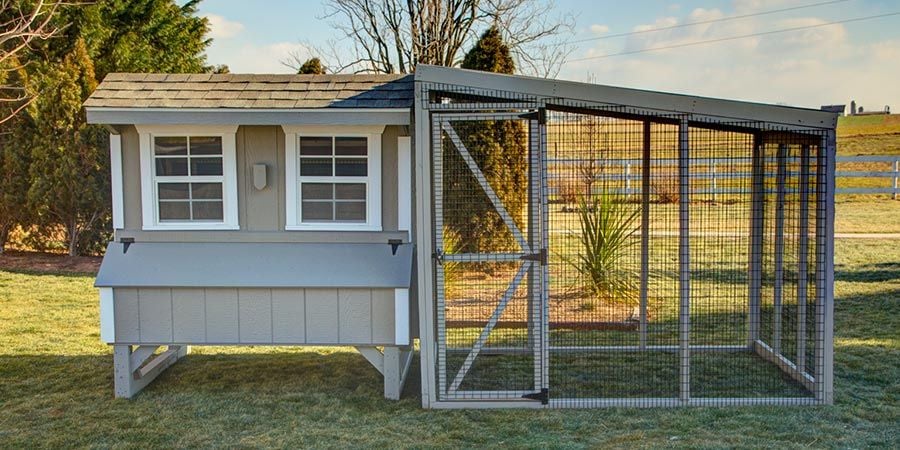
When it comes to setting up the ideal chicken coop, going beyond the basic necessities can greatly enhance the quality of life for your flock and simplify your poultry management routine. While essentials like security, ventilation, and space are non-negotiable, incorporating additional features can elevate a standard coop into a comfortable, functional, and efficient home for your chickens. Considering these features can help you create a more tailored and fulfilling environment for your flock.
Attached Run Area
An attached run area is a crucial extension of the coop that provides your chickens with a safe, enclosed area to roam, forage, and indulge in their natural behaviors. This space is vital for their physical health and mental stimulation. It should be spacious enough to prevent overcrowding and allow for natural pecking-order dynamics. Equipped with predator-proof fencing, it ensures your chickens can enjoy the outdoors without the risk of attack. Consider adding features like dust baths and perches in the run area for enhanced enrichment.
Storage Space
Adequate storage space in or near your chicken coop is essential for streamlined poultry care. This space is invaluable for organizing and storing feed, bedding, cleaning tools, and other supplies. Well-planned storage solutions keep these items dry, safe from pests, and easily accessible. It is not just a matter of convenience; it is about maintaining the cleanliness and orderliness of your chicken care routine. Ideally, storage areas should be designed to protect the feed from moisture and rodents and allow for easy restocking and retrieval of items.
Portability
The portability of chicken coop designs offers significant advantages, especially for those who practice rotational grazing or need to frequently change the location of their flock due to environmental conditions. A portable coop, often designed with wheels or easily dismantable structures, allows for the relocation of your chickens to areas with fresh pasture, helping to maintain the health of the land and providing your flock with new foraging opportunities. This mobility also aids in the management of parasites and pests, as it prevents the buildup of these nuisances in one particular area. The convenience of being able to move your coop effortlessly should not be underestimated, as it contributes significantly to the versatility and adaptability of your chicken-keeping practice.
Exploring Free-range Coops
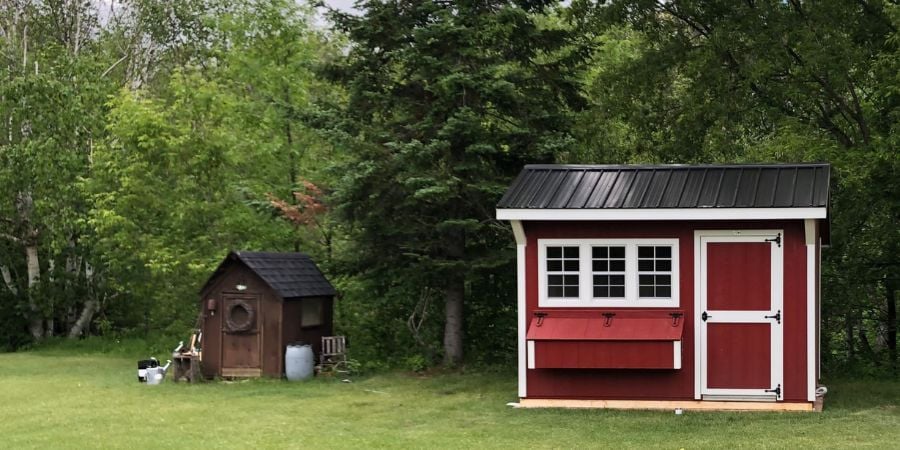
Embracing a free-range lifestyle for your chickens offers a return to their natural and instinctive way of life, where they have the freedom to roam, forage, and interact with their environment. Whether you are considering this option for ethical, health, or practical reasons, understanding the nuances of free-ranging is essential for making an informed decision that best suits your chickens' needs and your capabilities as a poultry keeper.
Advantages of Free-range Coops
Pest Control: Free-ranging chickens are natural pest controllers. As they forage, they consume a variety of insects, including ticks, beetles, and larvae. This helps keep the pest population in your yard under control. This not only benefits your garden but also reduces the need for chemical pest control methods.
Nutritional Benefits: A free-range diet, which typically includes grass, herbs, and insects, often leads to eggs and meat with a higher nutritional value. Studies suggest that eggs from free-range chickens have elevated levels of omega-3 fatty acids, vitamins, and a better omega-6 to omega-3 ratio, making them a healthier choice.
Exercise and Mental Health: Free-ranging allows chickens to engage in natural behaviors such as scratching, pecking, and dust bathing, which are essential for their physical and mental well-being. This increased space and freedom to roam result in more exercise, reducing obesity and improving overall health.
Enhanced Quality of Life: Chickens that free-range tend to have a higher quality of life. They experience less stress, display natural behaviors more frequently, and have a lower incidence of behavioral problems like feather pecking or cannibalism that can occur in confined spaces.
Disadvantages of Free-range Coops
Predator Risk: One of the biggest challenges with free-ranging chickens is the increased risk of predator attacks. Hawks, foxes, coyotes, and even neighborhood dogs can pose significant threats. This requires constant caution and potentially additional measures like guardian animals or secure fencing to protect the flock.
Egg Hunting: Free-range chickens may lay their eggs in unexpected and hidden locations, turning egg collection into a daily hunt. This can be time-consuming and sometimes results in eggs being missed, leading to issues like egg eating by the chickens or spoilage.
Garden Damage: Free-ranging chickens can be detrimental to certain garden areas. They may scratch up and devour young plants, dig in garden beds, and disturb mulch. This requires strategic planning of garden spaces and sometimes additional fencing to protect sensitive areas.
Health Risks: Free-range chickens are potentially more exposed to parasites and diseases that can be found in the environment. Regular health checks, deworming, and vaccinations become even more crucial to maintain the health of a free-ranging flock.
Exploring Enclosed Chicken Coops
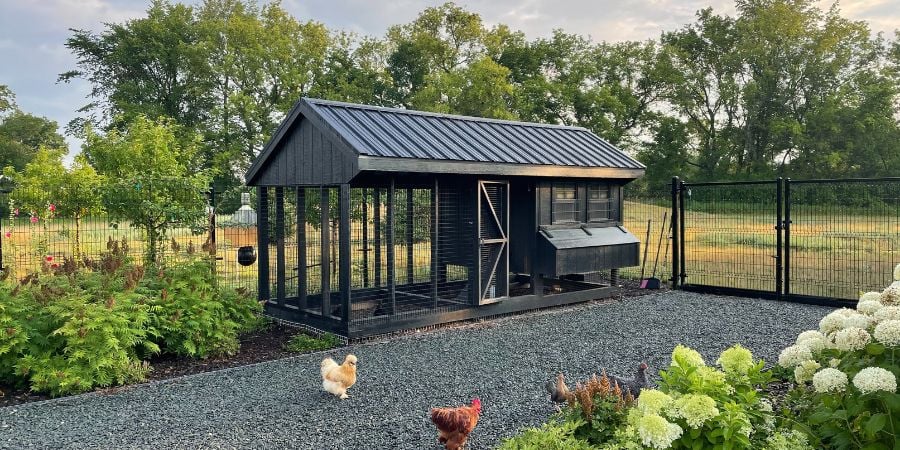
Choosing enclosed chicken coop designs represents a balanced approach to chicken keeping, combining the security of a confined space with the benefits of outdoor access. Enclosed coops with runs strike a crucial balance between protecting your flock from predators and harsh weather conditions and providing them with the opportunity to engage in natural behaviors outside the coop.
Advantages of Enclosed Runs
Safety From Predators: Enclosed runs provide a secure environment, significantly reducing the risk of predator attacks from animals such as foxes, hawks, and neighborhood pets. This added layer of security is especially important during times when you can not be around to supervise your flock.
Weather Protection: These coops offer a controlled environment that shields chickens from extreme weather conditions like rain, snow, high winds, and scorching sun. This is crucial for their health as chickens can be sensitive to harsh weather.
Egg Collection: With an enclosed chicken coop, chickens are more likely to lay their eggs in the provided nesting boxes, as opposed to hidden spots in a free-range scenario. This makes egg collection more predictable and efficient, reducing the chances of egg loss or damage.
Controlled Diet: Enclosed runs allow for better management of your chickens' diet. You can monitor their food intake more closely and ensure they are getting the necessary nutrients, which can sometimes be a challenge with free-ranging chickens.
Disease Control: By limiting exposure to wild birds and animals, enclosed runs can help reduce the risk of diseases, which can be brought into your flock from external sources.
Disadvantages of Enclosed Runs
Cleaning Frequency: Enclosed spaces can accumulate droppings and debris faster than larger, open areas. This requires more frequent cleaning to maintain hygiene and prevent the build-up of ammonia.
Attracting Flies: The concentration of chicken waste in a smaller area can attract flies and other pests. This not only creates an unpleasant environment but can also lead to health issues for your chickens.
Limited Foraging: Chickens in enclosed runs have less opportunity to forage, which can limit their natural behaviors and may require you to provide additional enrichment activities.
Space Limitations: Depending on the size of the run, chickens may have limited space to roam, which could potentially lead to stress and aggression among the flock.
Cost and Maintenance: An enclosed chicken coop with a run can be more expensive to build and maintain. They often require sturdy construction materials to ensure safety and durability, as well as ongoing maintenance to keep the structure and fencing in good condition.
Tailoring Your Chicken Coop to Fit Your Flock
Deciding between a free-range and an enclosed chicken coop is a significant decision that hinges on various factors, including the size of your flock, the available space in your yard, and your personal preferences in chicken rearing. Both free-ranging and enclosed coop options present their unique set of benefits and challenges. Chickens need enough room to move, feed, rest, and engage in natural behaviors, whether they are in an enclosed coop or roaming freely.
This guide aims to provide you with a comprehensive overview of the factors you need to consider when choosing a chicken coop, so you can make an informed decision. Shop smart, explore our diverse range of coops, and find the ideal home for your chickens that not only meets their needs but also fits seamlessly into your life and landscape. Remember, the right coop is out there, one that will provide a safe, comfortable, and happy home for your flock.




